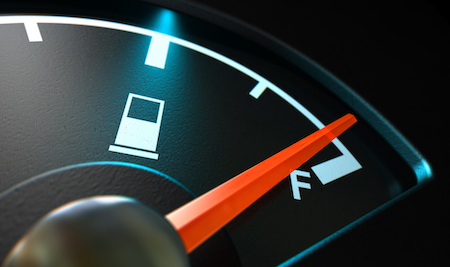As cars first became a mainstay in our everyday lives, fuel efficiency wasn’t even on our radar. Early manufacturers paid more attention to how fast a car could go, or how comfortable it was.
Still, cars in the early twentieth century consumed fuel very well. Ford’s Model T got up to 21 miles to the gallon. That’s only 6 miles per gallon less than the average car sold today.
It wasn’t until the 1970s that fuel efficiency became more popular. The Arab oil embargo created a worldwide shortage, causing fuel prices to skyrocket, and talks resumed about improving vehicles for less reliance on oil.
What is fuel efficiency?
Fuel efficiency refers to how well your vehicle consumes fuel. It’s become a key consideration when consumers search for new vehicles, and is currently driving the electric car market.
Fuel efficiency refers to how far a car can go with the fuel it consumes. It measures in miles per gallon, and is one of the main ways manufacturers can differentiate themselves from the competition.
Fuel efficiency is relative to other cars around it. Consumers shop based on their needs. A person with a fifty-mile commute each day may have different needs than someone who works remotely. Their needs and beliefs drive what cars they purchase, ultimately driving demand.
Fuel efficiency isn’t just about how many miles per gallon. Fuel efficiency also impacts how much pollution a car releases into the environment. As we’ve become more aware of how emissions affect global warming, manufacturers have once again gone back to the drawing board, looking for ways to make cars better.
A more efficient car saves on how much a vehicle consumes, as well as how much it pollutes. If you want to reduce your carbon footprint, increasing fuel efficiency is a start.
But it isn’t the only way.
Car maintenance can also make a difference. If a vehicle is well cared for, it runs cleaner and pollutes less no matter how many miles per gallon it gets.
Where do you start?
Regular tune ups make a car more efficient
When you visit your doctor once a year, it’s designed to check in and ensure everything is working well. Simple blood tests can reveal areas of concern.
Tune ups are designed similarly. It’s a way to bring your vehicle in for a check up, to ensure the engine is working well and doesn’t need repair. Your car’s engine is the heart of the system, and keeps many of the other parts working well. If a problem exists within the engine compartment, it can bring down efficiencies throughout the system. The Department of Energy has stated that when a car fails an emissions test, repairing it can improve performance anywhere from 4 to 40 percent.
Balance, rotate, and inflate your tires
The tires help connect you to the road, and provide proper support as you drive along. If they aren’t doing their job effectively, you’ll see the evidence in multiple ways.
It starts with ensuring they are properly inflated. Under-inflating them will decrease the surface area that connects with the road. Too much tire pressure, and you increase the strain, increasing the chance that they might blow.
Because your tires move and change regularly, it’s a good idea to have them rotated and balanced to keep them in their best condition. Manufacturers recommend balancing and rotating every 3,000 to 6,000 miles, or whenever you notice a problem. Balance issues often result in a vibration in your steering wheel, seat, or floor. This is a good time to pull in and ensure everything is working well.
Change the motor oil
When it comes to changing your car’s oil, stick with a regular schedule. The general rule is 3 months of 3,000 miles, whichever comes first. Today’s cars are more efficient than ever, with many manufacturers increasing recommendations. Check with your owner’s manual for what’s best for your vehicle.
As motor oil ages, it gets thicker and decreases the overall efficiency inside the engine. It can cause more friction, which in turn creates more heat. With increased heat comes a higher burn level, which means more fuel is burned with every turn of the engine.
Be sure to use the correct oil made for your car. If you stick with the recommended grade, you may boost fuel efficiency by as much as two percent.
Clean out the air filter
When you get an oil change, clean or change out the air filter too. It’s a component that helps eliminate pollutants that may otherwise damage your engine. A dirty air filter doesn’t have the ability to filter out particles that can cause damage inside the system.
Change out the spark plugs
Spark plugs help ignite the fuel as it moves into the engine. If they stop working or misfire, you’ll lose out on efficiency. Most manufacturers recommend replacing them about every 30,000 miles.
Slow down
Americans have an addiction to speed. And while that may be a huge safety concern, it also impacts fuel efficiency.
Up to about 60 miles per hour, your vehicle will generally burn less fuel as it picks up speed. However, after 50 miles per hour, the drag starts to require more fuel to keep the vehicle moving. Studies show this can be as high as 25 cents a gallon for every 5 miles per hour you increase. If you drive a lot of highway miles, the savings from slowing down can add up over time.
How can you improve fuel efficiency?
One of the easiest ways to keep your car in top condition is to pull in for an inspection on a regular basis.
This will keep your car operating well. It also reduces your chance of being stranded away from home.
When was the last time you scheduled an inspection?

